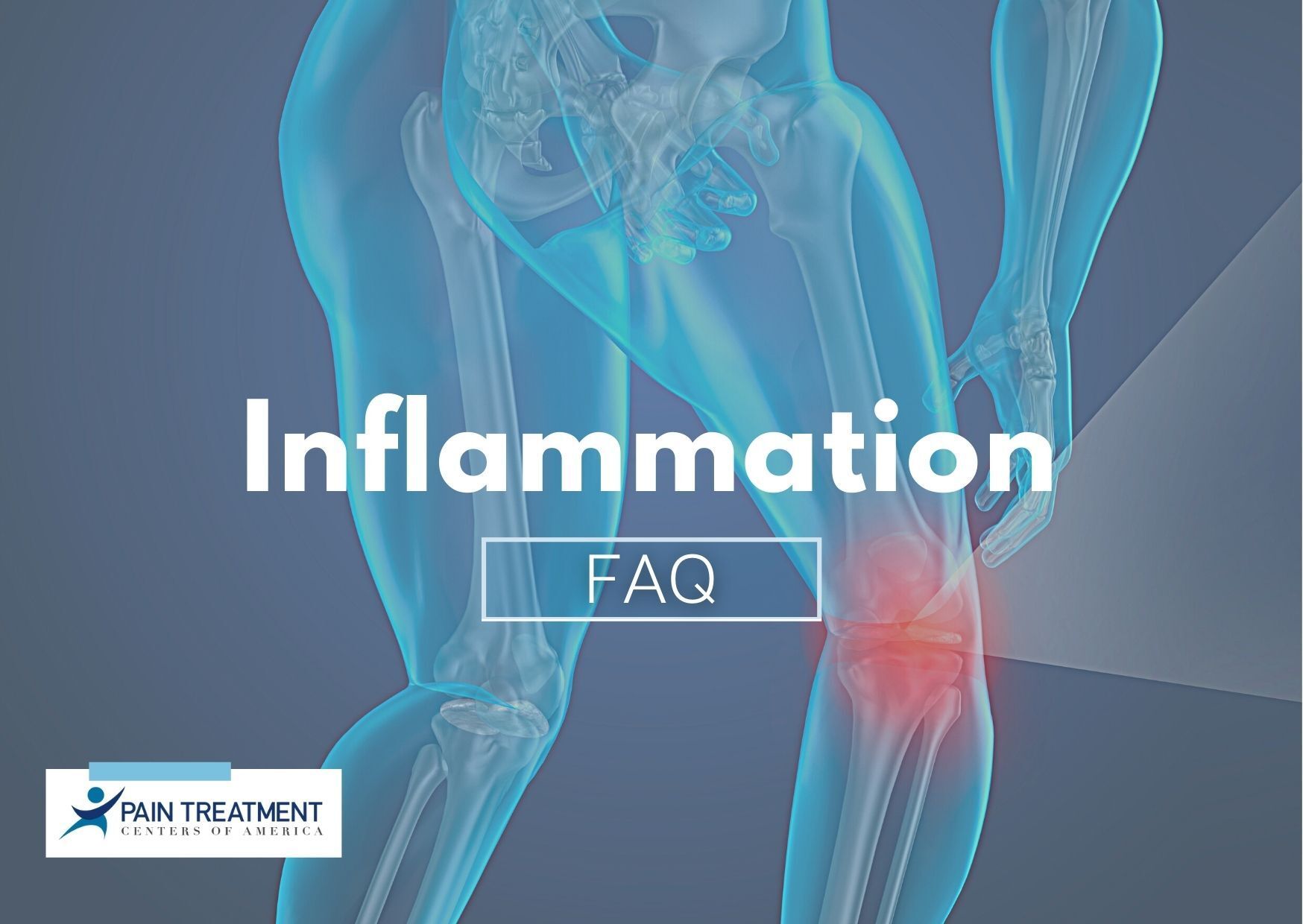Frequently Asked Questions about Inflammation

Unfortunately, far too many Americans, as many as one in five, know exactly what it's like to live with constant chronic pain. For these individuals, there are many causes of pain and discomfort that make it difficult to live a pain-free life. However, at its core, most pain comes down to one cause—inflammation.
What Is Inflammation?
In the medical sense, physical inflammation is the result of your body's immune defense system. When you have an injury, condition, or infection, your body will send white blood cells to the injured area. The job of these white blood cells is to fight off bacteria or viruses that may be attacking your body. They're also responsible for helping your body heal injuries.
Inflammation can be of two types: chronic and acute. Chronic inflammation is a condition that is somewhat permanent and long-lasting, while acute inflammation is temporary and usually caused by an injury that is healing. In many cases, simple over-the-counter medicines, ice, and rest may get rid of acute inflammation.
Inflammation is usually a healthy and normal immune response to an injury or event. It also plays a role as a critical diagnostic tool, often alerting doctors or medical personnel about an injury or infection. The problem occurs when the inflammation is chronic or occurs despite the fact that there is no injury. When this happens, it may be indicative of a more severe problem.
What Are Some Symptoms of Inflammation?
The most obvious sign of inflammation is a swollen physical area on your body. It may sometimes be difficult to tell if an area is swollen, which is why comparing it to the opposite limb is usually important.
However, there are also some less obvious signs of inflammation. Some of the cardinal signs of inflammation include:
● The area in question may also be extremely tender to the touch, feeling like a bruise.
● It may appear discolored or red.
● It may be warmer than usual. This can be indicative of an infection.
● The area may be particularly stiff and difficult to move.
There are also symptoms of inflammation that go beyond just the area of inflammation. You may feel sick or flu-like, feel fatigued, or have a fever. If this is the case, you should immediately seek medical care, as you may have an infection that requires prompt treatment.
What Can Cause Inflammation?
The most common cause of inflammation is an accident or injury. When this happens, the area in question will get swollen and tender. If you experience this type of inflammation, you may want to seek medical care. In many cases, you can find relief by simply resting the area in question, icing it, and elevating it.
However, more severe or chronic inflammation can result from a number of other issues. These include:
● An infection or illness. In this case, the inflammation is caused by your body rushing white blood cells to the area to battle the infection and purge it from your body.
● An injury.
● A disease of your immune system.
● Arthritis.
● Diabetes.
● Unhealthy habits or other physical conditions, like obesity, excessive alcohol use, or smoking.
There are also some medical conditions in which inflammation is the primary symptom. For example, chronic inflammation occurs when you repeatedly have inflammation in areas of your body, despite a lack of injury or infection. This can be hugely problematic. When all viruses or bacteria are removed, your body may continue to attack healthy tissue and organs, potentially causing long-term damage. As it stands, inflammation in the absence of an injury is a sign that something is wrong with your body's immune system. It often comes in conjunction with a variety of other symptoms, including pain, mental distress, appetite changes, weight changes, and more.
Can Inflammation Cause More Problems Than Pain?
Absolutely. A variety of evidence demonstrates that physical inflammation—such as the inflammation of certain organs—may be responsible for just more than pain.
It is essential to understand that regular inflammation is often linked to many diseases. Cancer, heart disease, arthritis, depression, and more have been tied directly to inflammation. While the causal nature of this relationship can go in either direction, inflammation unquestionably has a connection to many diseases, including some that you may never have expected.
For example, consider the potential connection between depression and inflammation. Many studies have noted that there is a connection between certain inflammatory symptoms—including inflammation of the brain—and depression. Some studies have also found there to be an improvement in depression symptoms if the inflammation is treated. The same studies have also found that inflammation of the brain can actually be directly responsible for specific behaviors, including anxiety, arousal, and more. The same inflammation can remove certain positive behaviors, such as motivation. As such, it seems clear that brain inflammation is one of many ways that inflammation can cause serious problems.
In the event of infection or injury, many organs can also become inflamed. If this happens, the organs may not function as well, and the individual risks dealing with the illnesses that come as a result.
How Can Inflammation Be Treated?
It is critical to understand that inflammation often requires a specialized approach, something we deal with extensively at Pain Treatment Centers of America.
Despite the problems that it can cause, inflammation can almost always be treated in some way. It may require a multi-faceted approach that uses many different treatment modalities, but it can be done.
First, as noted above, the vast majority of inflammation does not require extensive, professional treatment. The "RICE" method of healing—rest, ice, compression, elevation—will often do a wonderful job of managing the most common sources of injury or inflammation. In these cases, taking an over-the-counter pain reliever, such as Tylenol, can often help someone deal with an injury and recover.
For more severe cases, a more advanced treatment regimen may be necessary.
First, changes in diet can help reduce certain types of inflammation. Some foods contain components that can worsen inflammation, like trans-fats, certain oils, sugars, processed meat, and alcohol. This is probably not a huge surprise to anyone, as these types of foods have also been linked to a whole array of other illnesses and physical problems. Fortunately, there are also certain foods that can actually reduce inflammation. For example, fruits and vegetables—particularly those that have high levels of omega-3 fatty acids. Supplements of omega-3 fatty acids may also be beneficial. Other foods include tofu, walnuts, and some types of fish.
There is no question that exercise is extremely important to improve your quality of life, but it can also help reduce the harmful effects of inflammation. Exercise can stimulate your body and awaken your immune system, helping to better regulate its function and ensure that your body is responding in a healthier way. Of course, if you have been injured, exercise may not be advisable or possible, and you should speak with a professional before starting any exercise program.
Losing weight has also been tied to a reduced inflammatory response from your body. Excess weight puts strain on your body, causing your heart to work harder, your blood pressure to increase, and your immune system to become strained. Losing weight has many benefits, and it seems clear that reduced inflammation is one of them.
Inflammation is also often tied directly to stress. In fact, studies have directly tied the activation of your body's stress systems and hormones to numerous illnesses, a reduced lifespan, and inflammation. As such, managing your stress levels is considered to be critical in reducing inflammation and helping you live a more pain-free life. In some cases, a stress-reduction technique—such as yoga, meditation, or exercise—may be sufficient. In others, a variety of more intensive, life-altering techniques—such as psychological therapy or changing your profession may be necessary. Regardless of the cause, it is important to understand that stress can heighten the function of your immune system and the inflammation that often occurs as a result.
Treatment of pain often requires a special approach from experts in the field. If you are tired of living in pain and want to experience the benefits of seeing a caring specialist, reach out to Pain Treatment Centers of America.
With numerous locations across Arkansas, we can help you deal with your pain, reduce inflammation, and live the happy, healthy, and productive life you deserve. With physicians who strive to provide holistic care, cutting-edge surgery centers, CLIA certified labs, and medication monitoring, PTCOA is Arkansas' largest comprehensive pain management practice. You don't have to suffer from pain—instead, visit a center close to you or call us at 844-215-0731 for more information on how you can get back to living your life.













